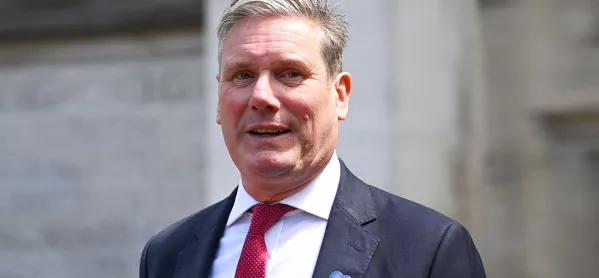Starmer promises to raise early years attainment

Labour would set the target of getting more than half a million more children to hit early learning goals (ELGs) by 2030 if elected, party leader Sir Keir Starmer is expected to say as part of a key speech on education policy tomorrow.
The Labour leader’s speech will focus on education reform, which the party describes as one of its five national missions.
Sir Keir is also expected to pledge to smash what he describes as a “class ceiling” if his party wins the next election.
Labour has already trailed a series of its new education policy plans this week, including sending regional improvement teams of teachers and school leaders into struggling schools and giving early career teachers a one-off payment for staying in the profession.
In the speech, Sir Keir is expected to say the party would boost child development with a target of half a million more children hitting ELGs by 2030.
The 17 ELGs were rolled out in 2019 and are designed to assess pupil achievements at the end of the Reception year - the last year of the early years foundation stage (EYFS) - covering areas such as being able to count to 20, read simple sentences and take turns when playing.
To reach a “good level of development” children must have reached the ELG in 12 of the 17 areas in which they are assessed.
The party has not provided further details. Currently, the progress of children up to the age of five is measured by early learning goals.
Data published last year showed that just under two-thirds (65.2 per cent) of pupils were considered to be at a good level of development at the end of EYFS.
- Linked: What schools need to know about Labour’s education plans
- Labour: Phillipson announces plan to ditch single-word Ofsted inspection grades
- Curriculum: Labour focused on skills as well as knowledge
Earlier this week Labour also revealed it was considering plans for more graduate teachers to work in nurseries and for more nursery places in primary school settings as part of a focus on early years.
On school reform, Sir Keir will say today that Labour will modernise the curriculum to “prepare young people with the knowledge, skills and personal qualities needed to thrive in work and life”.
And he will outline the party’s plans to end the teacher recruitment and retention crisis and pledge that “every child has an excellent specialist teacher in their classroom”.
The Labour leader is expected to warn that a “class ceiling” is stifling opportunity for too many children across the country in terms of pay, promotions and work opportunities.
He will say: “There’s also something more pernicious. A pervasive idea, a barrier in our collective minds, that narrows our ambitions for working-class children and says, sometimes with subtlety, sometimes to your face: this isn’t for you.
“Some people call it the ‘class ceiling’ - and that’s a good name for it. It’s about economic insecurity, structural and racial injustice - of course it is.
“But it’s also about a fundamental lack of respect. A snobbery that too often extends into adulthood. Raising its ugly head when it comes to inequalities at work - in pay, promotions, opportunities to progress.”
Reacting to the announcement, Geoff Barton, general secretary of the Association of School and College Leaders, said: “Education has been on the fringes of policymaking for too long and it is encouraging that Labour appears to recognise how central it should be. We look forward to examining their plans in more detail.
“One thing is for sure, unless the issues of pay erosion, inadequate funding and unmanageable workloads are addressed, then there are not going to be enough teachers and leaders working in schools and colleges to enact the positive changes we all want to see.”
Kevin Courtney, joint general secretary of the NEU teaching union, said: “We welcome the stress on the importance of early years education and note Labour’s recent recognition of the importance of maintained nursery schools, scandalously neglected by the current government.”
He also welcomed the party’s focus on teacher retention and called on Labour to commit to “a collective bargaining mechanism that can determine pay and conditions for all state-funded teachers”.
You need a Tes subscription to read this article
Subscribe now to read this article and get other subscriber-only content:
- Unlimited access to all Tes magazine content
- Exclusive subscriber-only stories
- Award-winning email newsletters
Already a subscriber? Log in
You need a subscription to read this article
Subscribe now to read this article and get other subscriber-only content, including:
- Unlimited access to all Tes magazine content
- Exclusive subscriber-only stories
- Award-winning email newsletters
topics in this article



